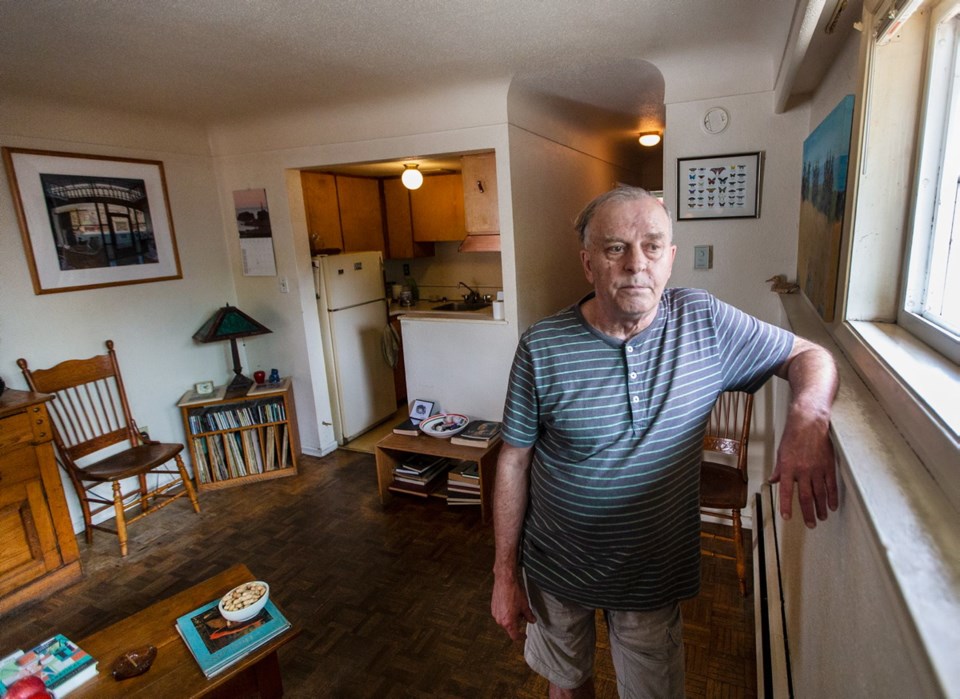A Victoria senior on a fixed income is fighting an eviction notice, the latest tenant to stand up against a string of evictions since two Fairfield apartment buildings were acquired by a Vancouver-based real estate company last year.
One of those tenants secured a victory before the Residential Tenancy Branch, and the landlord is now saying the evictions were served in error.
Martin Twocock is asking the Residential Tenancy Branch to quash his eviction notice, received May 30, asking him to vacate the suite by Sept. 30 so that the landlord can renovate.
Twocock, assisted by rental advocacy group Together Against Poverty Society, plans to argue at a hearing next week that the eviction is being done in bad faith, with the sole purpose of raising the rent. The 70-year-old, who is retired and relies on an old-age pension, pays $728 a month for a one-bedroom apartment and was told that a similar renovated unit would rent for $1,425 a month.
“I’m hoping the mediator looks at the excuse the landlord is using and realizes it’s merely camouflage for getting out a tenant so they can do a few cosmetic changes and charge the new tenant double the rent,” he said.
Twocock was given first right of refusal for the suite after the renovations, but said he can’t afford the higher rent.
He said two other tenants received eviction notices about the same time but neither are fighting it.
Headwater Projects purchased side-by-side apartment buildings at Fairfield Road and Â鶹´«Ă˝Ół»Street in April 2017. The company purchased the 18-unit building at 1009 Fairfield Rd. for just over $3 million and the 16-unit building at 575 Â鶹´«Ă˝Ół»St. for $3.1 million. The buildings are managed by Brown Bros. Agencies.
Eviction notices have been trickling out since then, some of them for reasons and others due to planned renovations.
Mike Large, a lawyer who lives in the building, said some tenants in the Fairfield building were offered payments if they left voluntarily.
“It seemed like the strategy was to go for the low-hanging fruit first,” Large said. First came the evictions, then the buyouts, followed by the “renovictions.”
Large has helped two of his neighbours successfully fight eviction notices.
One received a letter – just days before his Residential Tenancy Branch hearing – from the landlord informing him that the renovations would not go ahead and that he could stay in the unit.
And on Wednesday, the Residential Tenancy Branch cancelled Jenny Uhrig’s eviction notice on the grounds that the landlord failed to provide evidence that the renovations require the unit to be vacant.
The landlord argued the building still had the original fixtures from when it was built in the 1960s and said it wanted to “upgrade the building, and make it more appealing to tenants.”
Uhrig provided a letter from a contractor saying the unit does not need to be vacant for the work to be completed. She had offered to live with a friend while the work was underway and said she was willing to move her belongings around to accommodate a replacement of the bathroom, kitchen, floors and heaters.
In siding with Uhrig, the arbitrator relied on a B.C. Supreme Court ruling that an eviction notice is not necessary if the landlord can carry out renovations without ending the tenancy.
“There was really no reason for them to give me an eviction notice,” said Uhrig, a 37-year-old studying nursing at Camosun College. “It was an obvious rent grab. They wanted to increase the rent by 100 per cent.”
In a statement, Headwater Projects said: “Tenants residing at 1009 Fairfield and 575 Â鶹´«Ă˝Ół»were served eviction notices in error and [that] has now been rectified. Tenants were delivered letters detailing plans for the building with multiple options on how we could all benefit from future renovations and lengthen the lifespan of the buildings.”
That was news to Twocock. “If it was served in error, I’d like them to let me know,” he said Thursday evening.
Headwater Projects purchased its first building in Victoria in 2016, a 32-unit building at 2626 Cook St. Within months, it issued eviction notices so it could renovate the building and re-rent the units at market rates. Victoria-Swan Lake MLA Rob Fleming spoke out against the renovictions in January 2017 after being contacted by some of the tenants.
Large said landlords should have to file papers with the Residential Tenancy Branch before serving “potentially life-changing” eviction notices. This would allow the B.C. government to track the frequency of renovictions, he said.
“How can the government come to grips with these renovictions when it has no idea how often it’s happening?” he said. “Landlords can throw out these things like confetti, knowing that many will just pick up and leave because they don’t have the appetite to fight.”
In April, the NDP government introduced changes to the Residential Tenancy Act that requires landlords to give four months of notice instead of two when a tenant is asked to vacate because of a renovation or demolition.
Tenants now have a month to dispute the eviction with the Residential Tenancy Branch instead of 15 days.
Renters evicted by landlords who falsely claim they are going to renovate or that a family member is going to move in can be awarded 12 months worth of rent for a “bad faith” eviction. Previously, tenants only received two months worth of rent for such an eviction.



